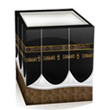Book 15: The Qur'an
- Details
- Category: Muwatta
- Published on Monday, 21 October 2013 10:40
- Hits: 1370
The Qur'an
Section: The Order to Be In Wudu (When Touching the Qur'an)
Book 15, Number 15.1.1:
Yahya related to me from Malik from Abdullah ibn Abi Bakr ibn Hazm that in a letter that the Messenger of Allah, may Allah bless him and grant him peace, sent to Amr ibn Hazm it said that no-one should touch the Qur'an unless he was pure.
Malik said, "No-one should carry the Qur'an by its strap, or on a cushion, unless he is pure. If it were permissible to do so, it would also have been permissible to carry it in its cover. This is not because there is something on the hands of the one who carries it by which the Qur'an will be soiled, but because it is disapproved of for someone to carry the Qur'an without being pure out of respect for the Qur'an, and in order to honour it."
Malik said, "The best thing that I have heard about this is the ayat 'None touch it except the purified.' (Sura 56 ayat 79) It ranks with the ayat in Surat Abasa (Sura 80), where Allah, the Blessed and Exalted, says, 'No, it is a reminder, and whoever wishes will remember it. Upon honoured pages, exalted and purified, by the hands of scribes, noble and obedient.' "
Book 14: The Qibla
- Details
- Category: Muwatta
- Published on Monday, 21 October 2013 10:39
- Hits: 1422
The Qibla
Section: The Prohibition against Relieving Oneself Facing the Qibla
Book 14, Number 14.1.1:
Yahya related to me from Malik from Ishaq ibn Abdullah ibn Abi Talha that Rafiibn Ishaq, a mawla of the family of ash-Shifa who was known as the mawla of Abu Talha, heard Abu Ayyub al-Ansari, one of the companions of the Messenger of Allah, may Allah bless him and grant him peace, say, while he was in Egypt, "By Allah! I don't know how to deal with these lavatories." The Messenger of Allah, may Allah bless him and grant him peace, said, "When you go to defecate or urinate, do not expose your genitals towards the qibla, and do not put your back to it."
Book 13: Asking for Rain
- Details
- Category: Muwatta
- Published on Monday, 21 October 2013 10:38
- Hits: 1343
Asking for Rain
Section: How to Ask for Rain
Book 13, Number 13.1.1:
Yahya related to me from Malik from Abdullah ibn Abi Bakr ibn Amr ibn Hazm that he had heard Abbad ibn Tamim say that he had heard Abdullah ibn Zayd al-Mazini say, "The Messenger of Allah, may Allah bless him and grant him peace, came out to the place of prayer and asked for rain, and when he faced the qibla he turned his cloak inside out."
Malik was asked how many rakas there were in the prayer of asking for rain and he said, "Two rakas, and the imam does the prayer before he gives the khutba. He prays two rakas, and then he gives a khutba and makes dua, facing the qibla and turning his cloak inside out. He recites out loud in both rakas, and when he turns his cloak inside out he puts what is on his right on his left, and what is on his left on his right, and all the people turn their cloaks inside out when the imam does so, and face the qibla, sitting."
Book 12: The Eclipse Prayer
- Details
- Category: Muwatta
- Published on Monday, 21 October 2013 10:38
- Hits: 1387
The Eclipse Prayer
Section: How to Pray the Eclipse Prayer
Book 12, Number 12.1.1:
Yahya related to me from Malik from Hisham ibn Urwa from his father that A'isha, the wife of the Prophet, may Allah bless him and grant him peace, said, "There was an eclipse of the sun in the time of the Messenger of Allah, may Allah bless him and grant him peace, and the Messenger of Allah, may Allah bless him and grant him peace, led the people in prayer. He stood, and did so for a long time. Then he went into ruku, and made the ruku long. Then he stood again, and did so for a long time, though not as long as the first time. Then he went into ruku, and made the ruku long, though not as long as thefirst time. Then he rose, and went down into sajda. He then did the same in the second raka, and by the time he had finished the sun had appeared. He then gave a khutba to the people, in which he praised Allah and then said, 'The sun and the moon are two of Allah's signs. They do not eclipse for anyone's death nor for anyone's life. When you see an eclipse, call on Allah and say, "Allah is greater" and give sadaqa.' Then he said, 'O community of Muhammad! ByAllah, there is no-one more jealous than Allah of a male or female slave of his who commits adultery. O community of Muhammad! By Allah, if you knew what I knew, you would laugh little and weep much'."
Book 11: The Fear Prayer
- Details
- Category: Muwatta
- Published on Monday, 21 October 2013 10:37
- Hits: 1392
The Fear Prayer
Section: The Fear Prayer
Book 11, Number 11.1.1:
Yahya related to me from Malik from Yazid ibn Ruman from Salih ibn Khawwat from someone who had prayed (the prayer of fear) with the Messenger of Allah, may Allah bless him and grant him peace, on the day of Dhat ar-Riqa that one group had formed a row with him and one group had formed a row opposite the enemy. He then prayed one raka with the group he was with, and then remained standing while they finished by themselves. They then left and formed a row opposite the enemy, and then the other group came and he prayed the remaining raka of his prayer with them, and then remained sitting while they finished by themselves. Then he said the taslim with them.




















